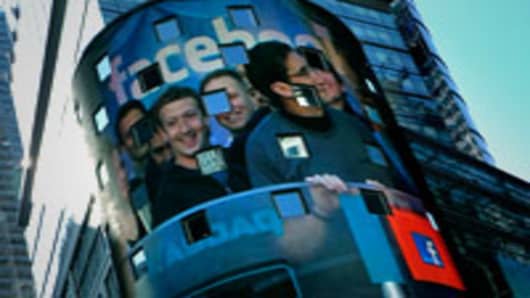Dozens more companies are within arms' reach, including Foursquare, WordPress, GitHub, Quora and Fab.
They have a lot to worry about. First, when you're the most expensive product on the shelf, very few companies can afford to buy you. Apple, Google and maybe Microsoft are on a short list of corporations that could finance an acquisition of this size without reaching for lint in their pockets afterward.
Given that Apple rarely makes acquisitions, that leaves Google, Microsoft and possibly Facebook .
And speaking of Facebook: after its lackluster initial public offering, when its stock dropped by half, going public isn't very appealing. Groupon, valued at $12.65 billion before its public offering at $20 a share, is now trading at a mere $2.98. Zynga, another member of the Club, is now $2.21 a share, down from a high of $15.91 this year.
"As a start-up valuation increases, the options definitely decrease," said Jon Callaghan, a partner with True Ventures who has been investing since the early 1990s. When you're valued at more than $1 billion, he said, "you have to have a flawless execution, as it's upping the ante quite a bit."
Some of these companies' valuations might be justified by revenue and growth. DropBox, for instance, has an estimated $500 million in revenue and 100 million users. Others, like Pinterest and Fab, are as overhyped as Pets.com was in Tech Bubble 1.0.
If these companies are deemed overvalued, they may have no option but to perform so-called down round investments, where a round of private financing prices a company at a lower valuation than a previous investment.
That almost happened to Spotify, the music streaming service. In May, the company was ready to close a round of financing that would have valued it at $4 billion. Then Facebook nose-dived,and Netflix, which is the closest example of a subscription-based online service like Spotify, also stumbled. Spotify finally closed a round this month that valued it at $3 billion — $1 billion off its projected valuation just six months ago.
"You certainly have more options at the $10 million valuation and a lot more paths you can go down," acknowledged Aaron Levie, chief executive of Box, a corporate cloud storage start-up. "But there's a virtue to having less options in that it gives us the ability to focus, and our visibility of what we need to do is much clearer."
Start-ups with higher valuations can also run into trouble when trying to woo new talent. If an engineer joins a company valued at $10 million that grows to $1 billion, there is an opportunity to get very rich. That is not the case when joining a company already valued at 10 figures that might slip to six or seven figures.
As for Facebook's paltry stock performance affecting other I.P.O.'s, Mr. Levie said this could actually help start-ups by allowing them to stave off investors and focus on their business models.
"Ultimately, it shouldn't be anyone's goal to go public; this is just a financing event to create liquidity for investors and shareholders," he said. "I'd be remiss if I didn't mention that there are eight to 10 companies that make $1 billion acquisitions in the enterprise space. It's mostly the consumer space where this becomes less probable."
He added, "There you really only have one suitor: Google."
Sometimes joining the Billion-Dollar Start-Up Club isn't really as much fun as it might seem.


